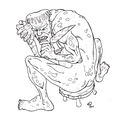Template:Selected anniversaries/May 14: Difference between revisions
No edit summary |
No edit summary |
||
| (38 intermediate revisions by the same user not shown) | |||
| Line 2: | Line 2: | ||
File:Culvert Origenes.jpg|link=Culvert Origenes|1678: Writer and philosopher [[Culvert Origenes]] publishes ''Historia Culvertica'', which will soon be widely plagiarized, influencing a generation of humanists. | File:Culvert Origenes.jpg|link=Culvert Origenes|1678: Writer and philosopher [[Culvert Origenes]] publishes ''Historia Culvertica'', which will soon be widely plagiarized, influencing a generation of humanists. | ||
File:Peder Horrebow.jpg|link=Peder Horrebow (nonfiction)|1679: Astronomer and mathematician [[Peder Horrebow (nonfiction)|Peder Horrebow]] born. | File:Peder Horrebow.jpg|link=Peder Horrebow (nonfiction)|1679: Astronomer and mathematician [[Peder Horrebow (nonfiction)|Peder Horrebow]] born. Horrebow will invent a way to determine a place's latitude from the stars. | ||
File:John Charles Fields.jpg|link=John Charles Fields (nonfiction)|1863: Mathematician [[John Charles Fields (nonfiction)|John Charles Fields]] born. He will found the Fields Medal for outstanding achievement in mathematics. | File:John Charles Fields.jpg|link=John Charles Fields (nonfiction)|1863: Mathematician [[John Charles Fields (nonfiction)|John Charles Fields]] born. He will found the Fields Medal for outstanding achievement in mathematics. | ||
|| | File:Ernst Kummer.jpg|link=Ernst Kummer (nonfiction)|1893: Mathematician [[Ernst Kummer (nonfiction)|Ernst Kummer]] dies. Kummer contributed to abstract algebra; in ring theory, he introduced the term ''ideal''. | ||
|| | File:Robert F. Christy Los Alamos ID.png|link=Robert F. Christy (nonfiction)|1916: Physicist and astrophysicist [[Robert F. Christy (nonfiction)|Robert F. Christy]] born. Christy will be credited with the insight that a solid sub-critical mass of plutonium can be explosively compressed into supercriticality, a great simplification of earlier concepts of implosion requiring hollow shells. | ||
|| | File:W._T._Tutte.jpg|link=W. T. Tutte (nonfiction)|1917: Mathematician, codebreaker, and academic [[W. T. Tutte (nonfiction)|W. T. Tutte]] born. During the Second World War, he will make a brilliant and fundamental advance in cryptanalysis of the Lorenz cipher, a major Nazi German cipher system. | ||
</gallery> | |||
{{Template:Categories: May 14}} | |||
Latest revision as of 09:18, 8 May 2024
1678: Writer and philosopher Culvert Origenes publishes Historia Culvertica, which will soon be widely plagiarized, influencing a generation of humanists.
1679: Astronomer and mathematician Peder Horrebow born. Horrebow will invent a way to determine a place's latitude from the stars.
1863: Mathematician John Charles Fields born. He will found the Fields Medal for outstanding achievement in mathematics.
1893: Mathematician Ernst Kummer dies. Kummer contributed to abstract algebra; in ring theory, he introduced the term ideal.
1916: Physicist and astrophysicist Robert F. Christy born. Christy will be credited with the insight that a solid sub-critical mass of plutonium can be explosively compressed into supercriticality, a great simplification of earlier concepts of implosion requiring hollow shells.
1917: Mathematician, codebreaker, and academic W. T. Tutte born. During the Second World War, he will make a brilliant and fundamental advance in cryptanalysis of the Lorenz cipher, a major Nazi German cipher system.





